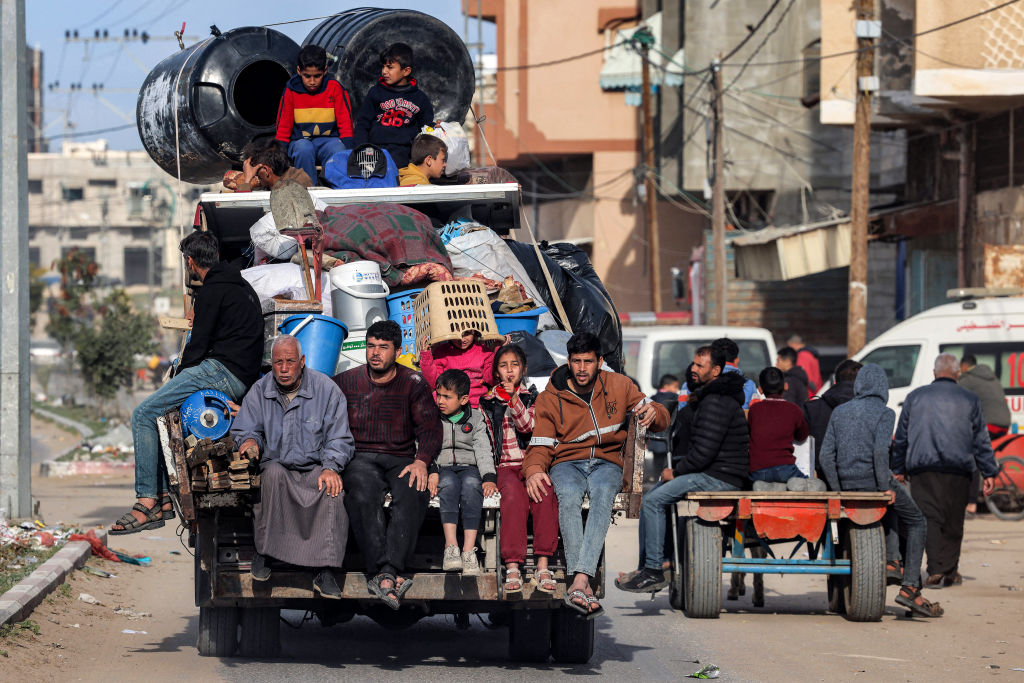

Israel Warns Palestinians to Leave Rafah, Seemingly in Preparation for Attack
Israel’s military has begun moving civilians out of Rafah, a possible prelude to a long-expected attack on the Gazan city.
The Israel Defense Forces “will act with extreme force against terrorist organizations in your areas of residence,” a spokesman said on X on Monday morning. He urged residents of eastern Rafah to go north to an “expanded humanitarian area” near Khan Younis, another city in Gaza.
[time-brightcove not-tgx=”true”]
The move comes after cease-fire talks between Hamas and Israel in Cairo over the weekend seemingly stalled, the main sticking point being the Iran-backed militant group’s insistence that any truce is permanent. Hamas also killed three Israeli soldiers with a rocket barrage on Sunday on the border crossing of Kerem Shalom, one of its worst missile attacks in weeks.
Israeli Prime Minister Benjamin Netanyahu has for months said civilians in Rafah would be moved out before any attack. There are more than one million in the city, most of whom fled there after the outbreak of the Israel-Hamas war in October.
Read More: Why Rafah Marks a Turning Point in the Gaza War
It’s unclear how long it would take for the bulk of the civilians to leave. Israeli officials privately admit it could take weeks, while the U.S. has expressed doubts that it can be done safely.
Most Arab and many European states have said Israel should not attack Rafah, fearing that would cause a mass of casualties.
The Israeli shekel weakened 0.9% to 3.74 per dollar as of 9:35 a.m. in Tel Aviv, heading more its biggest drop in almost three weeks.
Many civilians may choose to remain in Rafah if they’re unsure of the conditions where they’re going — Khan Younis, several miles from Rafah, has largely been destroyed since the war began on Oct. 7. Hamas, considered a terrorist organization by the U.S. and European Union, may also prevent some of them from leaving.
Israel says Rafah is the last bastion of Hamas, with about 5,000 to 8,000 of its fighters and senior leaders lodged in the city, as well as many Israeli hostages.
Shortly after the IDF’s announcement, residents in Rafah got calls with pre-recorded messages asking them to evacuate to the designated area.
“Most of my neighbors and many people in the neighborhood received this call,” Kareem Jouda, who’s sheltering in eastern Rafah, said to Bloomberg. “We don’t know yet what to do.”
The military also dropped leaflets.
Read More: The Coming Showdown Over Rafah
“The IDF is about to operate with force against the terror organizations in the area you currently reside,” one of them read in Arabic, according to the military. “Anyone in the area puts themselves and their family members in danger. For your safety, evacuate immediately.”
The IDF said 100,000 people fall under its “evacuation order” and the operation is limited in scope. It’s unclear if the military will soon start to try moving out people in other parts of Rafah.
The army instructed people not to go toward the border fence with Israel or Egypt. Rafah lies close to Egypt.
Cairo has said it won’t take in significant numbers of people fleeing the war as that would amount to a forced eviction and betray the Palestinians’ cause for an independent state. Egyptian officials have also said they’re concerned Hamas fighters could cross over with civilians if the border was opened.
The war erupted when Hamas attacked southern Israel from Gaza, killing 1,200 people and taking 250 hostage. Israel’s bombardment and ground attack on the Palestinian territory has killed almost 35,000 people, according to the Hamas-run health ministry.
Get the latest work and career updates delivered straight to your inbox by subscribing to our magazine category today. Stay informed and ahead of the game with Subscrb.
The content on this website has been curated from various sources and is for informational purposes only. We do not claim ownership of any of the content posted here, all rights belong to their respective authors. While we make every effort to ensure that the information is accurate and up-to-date, we cannot guarantee its completeness or accuracy. Any opinions or views expressed on this website are solely those of the original authors and do not necessarily represent our own. We do not endorse or take responsibility for the content or actions of external websites or individuals linked from this website. Any reliance on the information provided on this website is done at your own risk. Please note that this article was originally seen on the source website TIME, by the author Galit Altstein, Fares Akram and Kateryna Kadabashy / Bloomberg
-
SALE!




Forbes Asia Magazine Subscription
From: RM220 / year -
SALE!


Fortune Magazine Subscription
From: RM118 / year -
OUT OF STOCK




The Economist Magazine Subscription
From: RM1530 / year -


Inc. Magazine Magazine Subscription
From: RM22 / year -


Consumer Reports Magazine Subscription
From: RM22 / year -


Harvard Business Review Magazine Subscription
From: RM83 / month -


Entrepreneur’s Startups Magazine Subscription
From: RM4 / year -


BILLIONAIRE Magazine Subscription
From: RM131 / year



